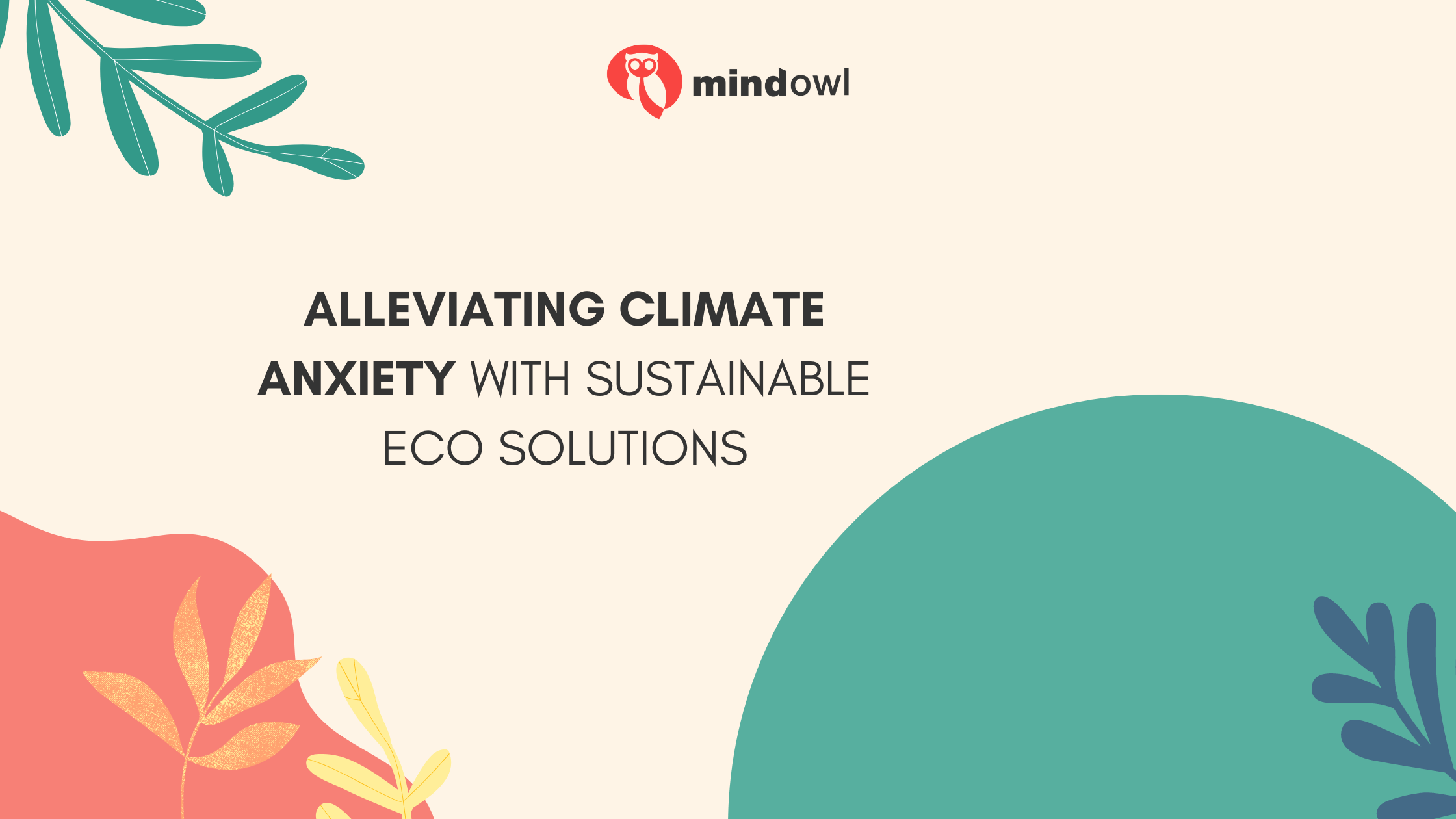Feeling anxious about the Earth’s future is common today. Studies show many people are facing eco-anxiety. This article offers ways to deal with such worries by choosing eco-friendly products and actions.
Let’s learn how to make a difference.

The Rise of Eco-Anxiety and Its Effects on Society
Eco-anxiety is gripping more people as they worry about climate change and its impacts. Reports from the American Psychiatric Association in 2017 highlighted this chronic fear of environmental doom for the first time.
The IPCC’s warning in 2021, calling climate change a “code red for humanity,” only added fuel to these fears. This anxiety not just sits on an individual level but seeps into society, affecting young ones too.
A survey showed that 57% of child psychiatrists in England have seen eco-anxiety in children and adolescents. People are scared of extreme weather events, losing their homes, and feeling powerless against the climate crisis.
This growing concern reflects a healthy response to what’s happening around us, Friends of The Earth argues. It shows people are paying attention to environmental issues and want to help make things better.
But it also brings negative effects like stress and helplessness among those who care deeply for our planet’s future. They feel pressured by daily news of natural disasters and governmental inertia on environmental policies.
This state has pushed individuals towards looking for ways to cope with eco-anxiety through sustainable choices, connecting with nature, or joining activism groups geared toward effecting positive change on ecological crises.
Sustainable Eco Solutions for Alleviating Climate Anxiety
Opt for sustainable products to lessen your carbon footprint and support environmental sustainability, while also easing feelings of eco-anxiety. Engage in environmental activism to connect with like-minded individuals, take meaningful action, and find comfort in contributing to positive change.
Choose Eco-Friendly Products
Choosing eco-friendly products is a powerful step towards reducing your carbon footprint and dealing with eco-anxiety. It shows you are taking action to protect our planet.
Eco-friendly cleaning products, like those offered by Melaleuca company, are made with natural ingredients. They do not contain harsh chemicals, which means less exposure to toxins for you and your family. Founded in 1985, by Frank VanderSloot, Melaleuca focuses on delivering high-quality products that are safer for the home, effective, and environmentally responsible.
- Look for items with less packaging. This means buying fruit and vegetables that aren’t wrapped in plastic.
- Recycle everything you can. From paper to plastic, make sure it goes into the correct bin.
- Cut down on meat and dairy products. These industries have a big impact on the environment.
- Use your bike or walk if you’re going a short distance instead of driving.
- Help out with local environmental groups or join litter-picking events to clean up nature areas.
- Save water by taking shorter showers and fixing leaks quickly.
- Lower your energy use by turning off lights when you leave a room and using energy-efficient bulbs.
- Pick banks and shops that support ethical practices, this supports companies who are also fighting climate change.
- Buy fewer things overall, think about whether you really need an item before purchasing.
- Reuse what you can, like carrying a reusable water bottle instead of buying bottled water.
These steps help reduce waste, lower emissions, and promote sustainability in our daily lives, helping to ease feelings of eco-guilt while actively contributing to earth’s wellbeing.
Participate in Environmental Activism
Taking part in environmental activism can lessen feelings of helplessness and despair linked to climate anxiety. It provides a sense of community and purpose, encouraging people to act together in facing ecological challenges.
- Join local environmental groups. Find groups that focus on preserving local parks or reducing pollution. This is a great way to meet others who care about the planet.
- Support reforestation efforts. Planting trees helps restore habitats and absorbs CO2 from the atmosphere. Join or donate to organisations that plant trees worldwide.
- Take part in community-supported agriculture (CSA). By supporting local farms, you help reduce the carbon footprint associated with transporting food long distances.
- Engage with social media campaigns focused on ecological issues. Share posts, information, and news articles to raise awareness among your network.
- Attend workshops or seminars about sustainable living practices. Learning more about how to live sustainably can inspire you to make environmentally friendly choices daily.
- Volunteer for clean-up drives in your area. Helping clean beaches, parks, and rivers removes litter that harms wildlife and water sources.
- Write letters to your government representatives urging them for stronger environmental policies and actions against climate change.
- Reduce the use of single-use plastics by choosing reusable options instead, highlighting the importance of individual actions in creating larger change.
- Encourage friends and family to join you in these activities, spreading the message further and strengthening the movement through numbers.
Each step taken towards engaging in environmental activism not only contributes to combating the effects of climate change but also empowers individuals, giving them control over their impact on the planet’s future.
Conclusion
Eco-anxiety is real, and it affects many of us deeply. Choosing eco-friendly products and joining environmental activism can help ease this anxiety. Actions like conserving water or reducing meat intake show that small steps lead to big changes.
These choices connect us with nature and inspire hope for our planet’s future. Let each action remind us we’re not alone in this fight for a healthier world.
MindOwl Founder – My own struggles in life have led me to this path of understanding the human condition. I graduated with a bachelor’s degree in philosophy before completing a master’s degree in psychology at Regent’s University London. I then completed a postgraduate diploma in philosophical counselling before being trained in ACT (Acceptance and commitment therapy).
I’ve spent the last eight years studying the encounter of meditative practices with modern psychology.

